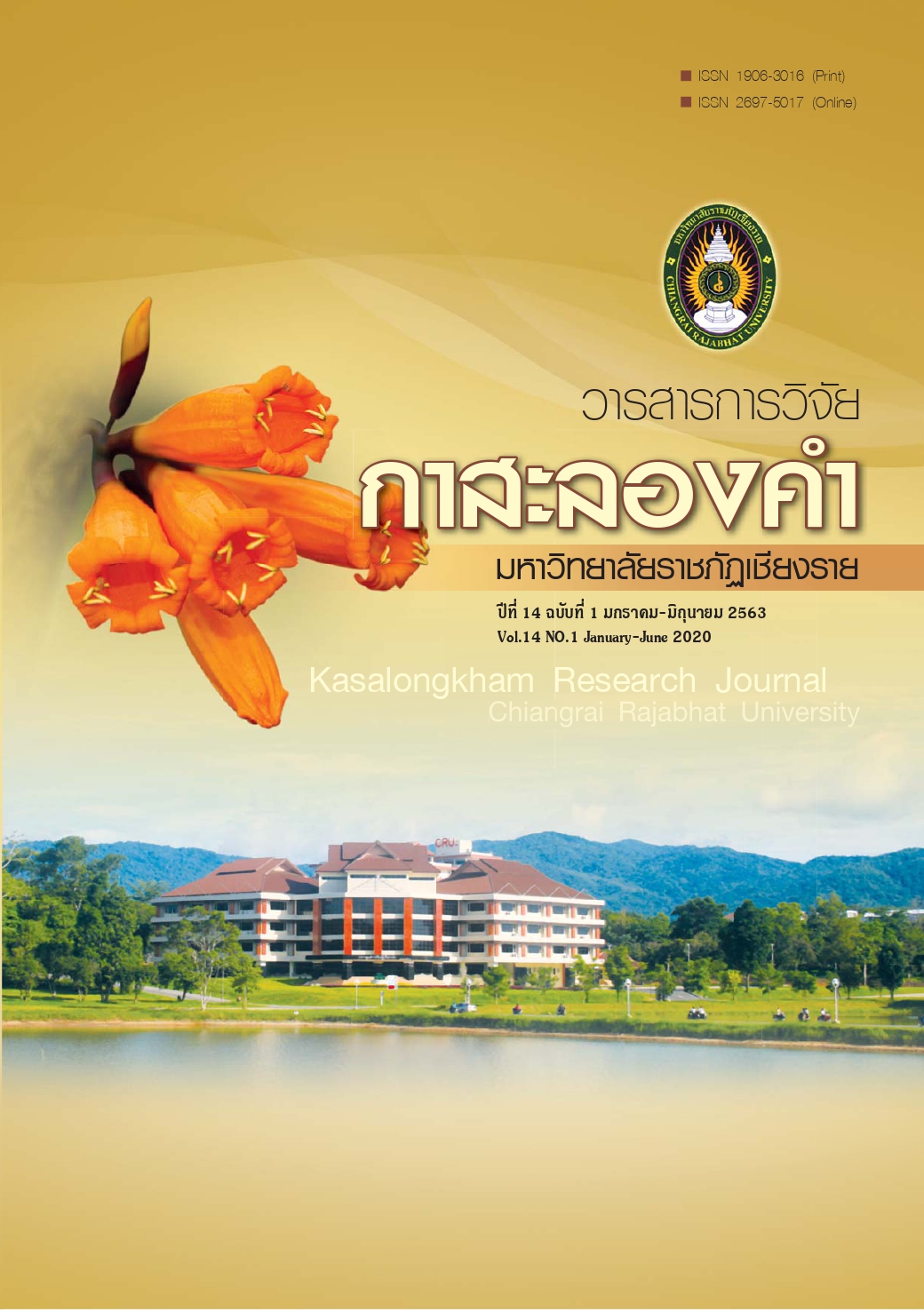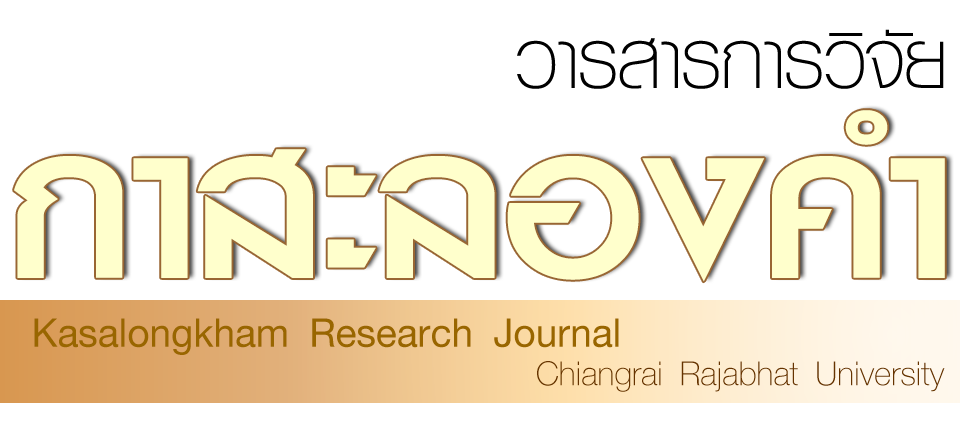แรงจูงใจในการทำงานของพนักงานผู้ให้บริการธุรกิจการแพทย์แผนไทย: กรณีพนักงานผู้ให้บริการในพื้นที่อำเภอเมือง จังหวัดเชียงราย
คำสำคัญ:
แรงจูงใจในการทำงาน, การแพทย์แผนไทย, ธุรกิจบริการบทคัดย่อ
การวิจัยนี้ศึกษาแรงจูงใจในการทำงานของพนักงานผู้ให้บริการการแพทย์แผนไทย ปัญหาการขาดพนักงานที่มีทักษะมีผลต่อการดำเนินงานและการคงอยู่ของธุรกิจ ความสำเร็จของธุรกิจส่วนหนึ่งเกิดจากแรงจูงใจของพนักงานนำไปสู่ปัญหาของการวิจัยนี้ซึ่งมีวัตถุประสงค์ (1) ศึกษาประเด็นแรงจูงใจของพนักงาน และ (2) ค้นหาอุปสรรคบั่นทอนในการทำงานของพนักงาน การวิจัยนี้ใช้การสัมภาษณ์เชิงลึกและผู้ให้ข้อมูลคือพนักงานจำนวน 21 คน ซึ่งทำงานในสถานบริการการแพทย์แผนไทยในพื้นที่อำเภอเมือง จังหวัดเชียงราย เมื่อข้อมูลอิ่มตัวผลการวิเคราะห์ข้อมูลพบว่า พนักงานเห็นโอกาสทางวัฒนธรรม ภูมิปัญญาไทย ที่เป็นพื้นฐานความรู้ในอาชีพ เป็นจูงใจภายนอกที่ได้ค่าตอบแทนเพียงพอเมื่อเทียบกับระดับการศึกษาของพนักงาน แรงจูงใจภายในเกิดจากการยอมรับจากผู้ใช้บริการและสังคม แรงจูงใจทั้งสองด้านทำให้เกิดความรู้สึกการมีคุณค่าในตนเอง มีความสุขในการทำงานจากการช่วยเหลือผู้อื่นให้พ้นทุกข์ อุปสรรคบั่นทอนจิตใจและการทำงานคือภาพลักษณ์ของอาชีพ การวิจัยนี้ยังพบว่าระดับแรงจูงใจสูงของพนักงานสอดคล้องกับความต้องการของผู้ใช้บริการที่เพิ่มขึ้น หน่วยงานของรัฐควรสนับสนุนธุรกิจโดยการส่งเสริมการฝึกอบรม พัฒนามาตรฐานวิชาชีพและธุรกิจ และพิจารณาหลักเกณฑ์และจริยธรรมการทำงาน
เอกสารอ้างอิง
นิฤมล สว่างมณีวงศ์. (2559). การจัดการธุรกิจขนาดกลางและขนาดย่อม. กรุงเทพมหานคร: โรงพิมพ์
มหาวิทยาลัยรามคำแหง.
แนวทางการดำเนินงานสถานประกอบการเพื่อสุขภาพ.(2560) กองสถานประกอบการเพื่อสุขภาพ. กรม
สนับสนุนบริการสุขภาพ กระทรวงสาธารณสุข. http://www.thaispa.go.th/spa2013/web/ web_new/fileupload_doc/2017-11-15-3-17-2522507.pdf
วิชัย โชควิวัฒน (2560). การแพทย์แผนไทยในยุคประเทศไทย 4.0 ภายใต้ยุทธศาสตร์ชาติ 20 ปี วารสาร
การแพทย์แผนไทยและการแพทย์ทางเลือก 15(3), 277-286.
Atkinson, J. W., and Brich, D. (1978). Introduction to motivation (2nd ed.). New York: D. Van Nostrand.
Ballout, H. I. (2009). Career commitment and career success: Moderating role of self-efficacy. Career
Development International. 14(7), 655-670.
Bandura, A. (1986). Social foundations of thought and action: A social cognitive theory. Englewood
Cliffs: Prentice-Hall.
Beck, R. C. (1983). Motivation: Theories and principles. Englewood Cliffs: Prentice-Hall.
Cheramie, R. (2013) An examination of feedback-seeking behaviors, the feedback source and career
success. Career Development International, 18(7), 712-731.
Carson, K. D., and Bedeian, A. G. (1994). Career commitment: Construction of measure and
examination of its psychometric properties. Journal of Vocational Behavior, 44, 237-262.
Certo, S. C., Peter, J. P. (1990). Strategic management: A focus on process. New York: McGraw-Hill.
Danciu, V. (2013). The sustainable company: New challenges and strategies for more sustainability.
Theoretical and Applied Economics. 10(9), 7-26.
Dess, G. G., Lumpkin, G. T., and Elsner. (2010). Strategic management: Text and cases. New York:
McGraw-Hill.
Geen, R. G., Beatty, W. W., and Arkin, R. M. (1984). Human motivation: Physiological, behavioral, and
social approaches. Boston: Allyn and Bacon.
Ginzberg,Eli.(1974). Counseling for career development. Boston: Houghton Mifflin.
Hax, A. C., and Majluf, N. S. (1996). The strategy concept and process: A pragmatic approach (2nd ed.).
New Jersey: Prentice Hall.
Janssan, Nilsson, Modig and Vall. (2017). Commitment to Sustainability in Small and Medium- Sized
Enterprises: The Influence of Strategic Orientations and Management Values. Business Strategy
and the Environment. (pp. 69-83). 26(1). February 2017
Katz, D., and Kahn, R. L. (1978). The social psychology of organizations (2 nd ed.). New York” John
Wiley and Sons.
May, G. (2010). Strategic planning: Fundamentals for small business. New York: Business Expert Press.
Morioka, M. N., Evans, S., and de Carvalho, M. M. (2016). Sustainable business model innovation:
Exploring evidences in sustainability reporting. 659-667.
Nerurkar, O. (2017). A framework of sustainable business models. Indian Journal of Economics and
Development. 5(3), 1-6.
Kuriloff, Arthur., John M. Hemphill Jr., and Douglas Cloud. (1993) Starting and Managing The Small
Business.3d ed., Singapore: McGraw-Hill
Salimzadeh, P., Courvisanos, J., and and Nayak, R. R. (2013). Sustainability in small and medium
enterprises in regional Australia: A framework of analysis (pp. 11-22) Paper presented at 26th
Annual, Sydney.
Sidik, I. G. (2012). Conceptual framework of factors affecting SME development: Mediating factors on
the relationship of entrepreneur traits and SME performance. 373-383.
Thompson, Strickland, and Gamble. (2010). Crafting and Executing Strategy: The Quest for Competitive
Advantage : Concepts and Cases. New York: McGraw-Hill/Irwin
Weiten, W. (2014). Psychology: Themes and variations. Australia: Wadsworth.
Wheelen, T. L., and Hunger, J. D. (2010). Strategic management and business policy: Achieving
sustainability. (12th ed.). Boston: Prentice Hall.






